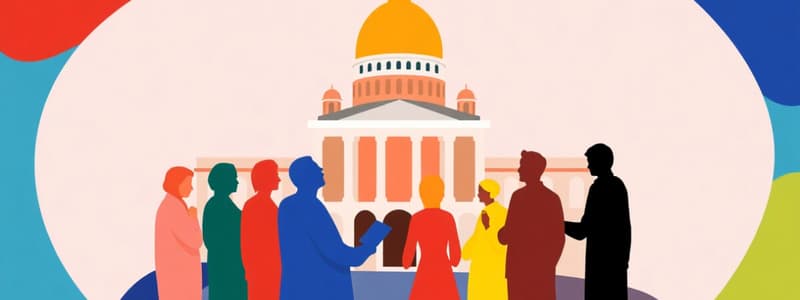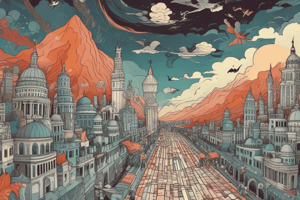Podcast
Questions and Answers
What was the significance of Adam Smith's beliefs regarding property ownership?
What was the significance of Adam Smith's beliefs regarding property ownership?
Which economic system promotes ownership of production means by the government?
Which economic system promotes ownership of production means by the government?
What does the theory of individualism in a democratic system imply?
What does the theory of individualism in a democratic system imply?
How did capitalism theoretically benefit society according to Adam Smith?
How did capitalism theoretically benefit society according to Adam Smith?
Signup and view all the answers
What potential negative impact of capitalism on democracy is mentioned?
What potential negative impact of capitalism on democracy is mentioned?
Signup and view all the answers
What is one characteristic of a representative form of government?
What is one characteristic of a representative form of government?
Signup and view all the answers
Which of the following best describes an oligarchy?
Which of the following best describes an oligarchy?
Signup and view all the answers
Which aspect of direct democracy is exemplified by town meetings in New England?
Which aspect of direct democracy is exemplified by town meetings in New England?
Signup and view all the answers
What distinguishes a totalitarian government from others?
What distinguishes a totalitarian government from others?
Signup and view all the answers
Which statement accurately reflects the nature of an absolute monarchy?
Which statement accurately reflects the nature of an absolute monarchy?
Signup and view all the answers
What distinguishes a direct democracy from a representative government?
What distinguishes a direct democracy from a representative government?
Signup and view all the answers
What concept suggests that the government should be influenced by the wealthiest individuals in a capitalist society?
What concept suggests that the government should be influenced by the wealthiest individuals in a capitalist society?
Signup and view all the answers
In which of the following systems does a single political party control voting and governance?
In which of the following systems does a single political party control voting and governance?
Signup and view all the answers
Which of the following characteristics is typical of an absolute monarchy?
Which of the following characteristics is typical of an absolute monarchy?
Signup and view all the answers
Which of the following statements best illustrates a critique of capitalism as suggested in the content?
Which of the following statements best illustrates a critique of capitalism as suggested in the content?
Signup and view all the answers
What is a key characteristic of an oligarchic government?
What is a key characteristic of an oligarchic government?
Signup and view all the answers
According to the content, how does capitalism theoretically relate to individual freedom?
According to the content, how does capitalism theoretically relate to individual freedom?
Signup and view all the answers
Which political system emphasizes the dominance of the government over individual citizens?
Which political system emphasizes the dominance of the government over individual citizens?
Signup and view all the answers
What is one major assumption of democracy in relation to capitalism, as inferred from the content?
What is one major assumption of democracy in relation to capitalism, as inferred from the content?
Signup and view all the answers
What alternative economic system is presented as a counter to capitalism in the content?
What alternative economic system is presented as a counter to capitalism in the content?
Signup and view all the answers
Study Notes
What is Government?
- Government is the means by which a society organizes itself and allocates authority to achieve collective goals and provide needed benefits
- Government affects many aspects of daily life, including what people eat, where they go to school, how their taxes are spent, and how they spend their free time
- Americans are often unaware of the extent of government's role in their daily lives, and many are unsure what government precisely does
- Government's goals often include economic prosperity, secure borders, and the safety and well-being of citizens.
- Governments provide various benefits, such as education, healthcare, and infrastructure for transportation.
- Politics is the process of gaining and exercising control within a government to achieve particular goals, especially related to resource distribution.
- Private goods are produced and supplied by private businesses that earn a profit for their effort.
- Public goods and services, like national security, are difficult for private businesses to provide
- Common goods, such as fish in the ocean or clean drinking water, must be properly managed to ensure availability for all.
Defining Government
- Government is often confused with economic systems, as some political philosophies are closely tied to certain economic systems.
- Capitalism and democratic republics emerged roughly simultaneously, particularly in Western Europe and North America.
- The concept of liberty became important, with John Locke arguing that all people have natural rights to life, liberty, and property, and that people have the right to govern themselves.
- In the 18th century, the idea emerged that people should govern themselves through elected representatives, instead of a king.
- Adam Smith believed that individuals should be free to pursue their own interests without government control.
- Socialist societies are characterized by government ownership of the means of production.
- The United States has a system that combines democratic governance with a capitalist economy.
Different Types of Government
- Democracy is a system where political power rests with the people
- In a representative democracy, citizens elect representatives to make decisions and pass laws on their behalf.
- In a direct democracy, citizens directly participate in decision-making.
- Monarchy: One ruler, often hereditary, holds political power.
- Oligarchy: A small group of elites holds all political power, often seen in non-democratic societies.
- Totalitarianism is a form of government where the government controls all aspects of citizens' lives, limiting rights and opposition. North Korea is an example.
- Representative democracies, like the United States, often prioritize majority rule, but still protect minority rights.
- Town meetings are one example of direct democracy, where citizens directly discuss and vote on local issues.
Studying That Suits You
Use AI to generate personalized quizzes and flashcards to suit your learning preferences.
Related Documents
Description
This quiz explores the fundamental aspects of government, its role in society, and the intricate relationship between politics and economic systems. Learn about how government influences daily life and the collective goals it seeks to achieve. Test your understanding of the various benefits that government provides to its citizens.




